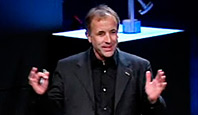
Is nothing sacred? Michael Shermer, Scientific American's Skeptic columnist, reports in the November issue that one of the icons of psychology, the five stages of grief, has been debunked.
Launched by Elizabeth Kubler-Ross in her book On Death and Dying (1969), the model of denial-anger-bargaining-depression-acceptance is one of the most widely known paradigms in modern psychology. But, according to Shermer's sources, there appears to be no evidence that most people most of the time go through most of those stages in that order, or any other order.
The five stages of grief, along with similar "stage" theories, Shermer says, satisfy people's craving for simplicity and predictability. Unfortunately, the scientific basis for them is just not there. And they can also impose feelings of guilt and shame on people who are not feeling what they think they should. And, in today's world, people who follow the simple "stages" narrative are the exception, while diversity and individual variation are the rule.
Good grief! What's next? Are we going to learn that there is no evidence that most people recovering from addiction go through a certain well known set of steps?
2 comments:
Robert West, in his interesting if dense book, Theory of Addiction takes on another of the sacred sequences, the Transtheoretical Model of behavioral change. That's the model that says that change occurs neatly in five steps: precontemplation, contemplation, preparation, action, and maintenance. West points out this immensely popular model assumes a much more coherent and stable planning process than most folks use. It focuses attention away from conditioning, habit, and consequence ... things that motivate a lot of real behavior, especially addictive behavior. Worse, West argues, it can promote the wrong strategies. It promotes "moving people along" the stages. It promotes not trying too hard with the "pre-contemplators". Bolder action is often warranted on both counts.
"All models are wrong, but some are useful" is a well-known quote by the less-well-known George Box. The problem here, as elsewhere, isn't that the sequence is wrong. The problem is there isn't much evidence the model can guide useful action ... and it may misdirect.
The five stages of grief did NOT correspond with my experience. Just my 2 cents.
Post a Comment